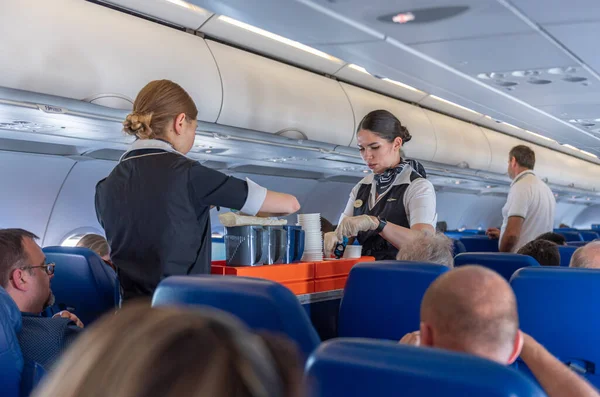
“The airplane is not your kitchen and some menu items should stay firmly on the ground.” That’s the blunt truth many seasoned flight attendants share when asked what they, personally, avoid consuming at 35,000 feet. While passengers might think that everything served on board has to be safe and carefully prepared, the fact is that comfort, health, and even etiquette can be in real jeopardy when certain foods and drinks are consumed.
From the dubious quality of the water to the science of bloating in pressurized cabins, these tips aren’t about being picky; they’re about avoiding the discomfort and risks that can make a long-haul flight feel endless. Of course, even the most seasoned traveler may be surprised by a few items on this list:
Here are the things flight attendants and health experts say should be on every traveler’s “no-fly” list when it comes to in-flight dining-and why skipping them could make your journey far more pleasant.
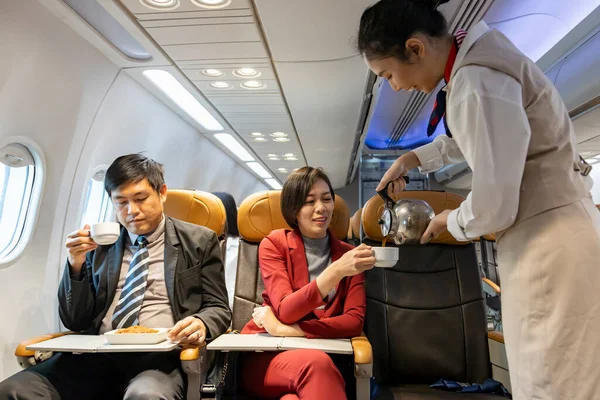
1. Coffee and Tea from Onboard Water Tanks
Several former flight attendants, including Alex Quigley and TikTok influencer Kat Kamalani, have publicly issued warnings about ordering coffee or tea brewed with aircraft water. Airplanes have “potable” water tanks that can go long stretches without proper cleaning. In one 2019 study from CUNY Hunter College, nearly every regional airline was in violation of the EPA’s Aircraft Drinking Water Rule at least once, requiring tanks be disinfected four times annually, or tested monthly for microbes like E. coli.
Beyond the cleanliness issue, Quigley said, coffee left over is often dumped in the aircraft’s lavatory-a fact that adds to the ick factor. Some aviation mechanics insist tanks are flushed regularly, but experts advise sticking with sealed bottles or cans to avoid any possibility of bacterial exposure.
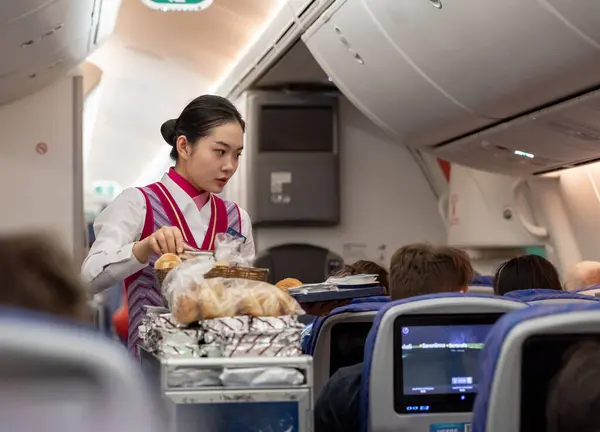
2. Pungent Snacks
Odors can really travel in a pressurized cabin, and some snacks have the ability to take a pleasant flight and turn it into an unpleasant experience for fellow passengers. The attendants especially single out barbecue corn nuts, onion chips, or anything with a heavy amount of garlic as offenders. One attendant said opening up a bag of roasted barbecue corn nuts “smells like something is burning on the plane.”
The etiquette experts also warn against hot, greasy fast food on board. Fish, eggs, and Brussels sprouts are known for their strong, lingering scents. If one is feeling hungry before boarding, buy cold, neutral-smell foods like salads or packaged sandwiches offered by airport kiosks.
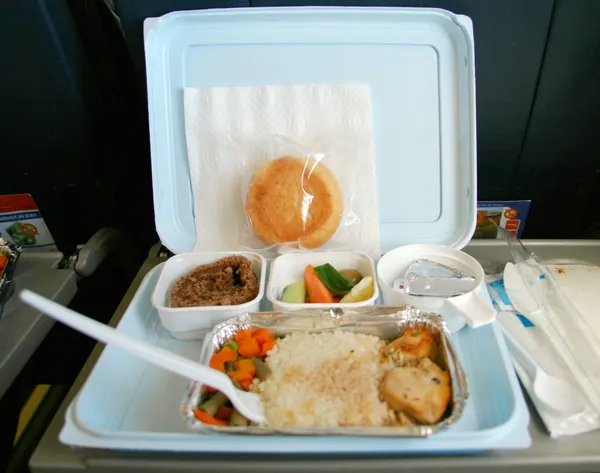
3. Meat dishes
Quigley suggests avoiding every meat-based meal on board due to the risk at stake in its storage once delays or mechanical issues arise. Poor temperature control may let bacteria grow, thus increasing the risk of foodborne illness during a flight.
That’s a concern repeated by food safety professionals: hot foods must remain above 135°F, cold foods below 40°F, and bacteria will double every 20 minutes. Aviation catering entails so many steps of handling with limited refrigeration that it becomes incredibly hard to ensure safety in each and every one of them-a gamble few travelers want to take.
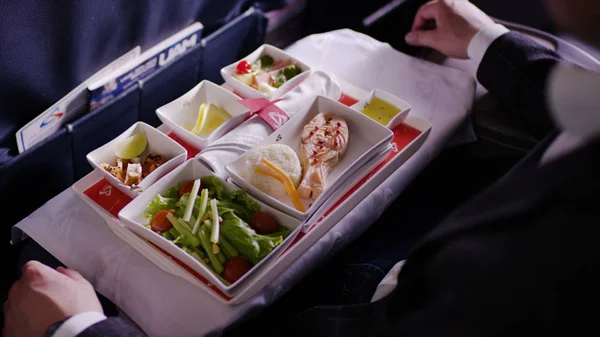
4. Gas-Inducing Foods
Changes in cabin pressure cause gases in the stomach and intestines to expand, leading to bloating and discomfort. Beans, dairy, fatty foods, and some green vegetables, like broccoli, are common offenders. According to gastroenterologist Rudolph Bedford, “changes in cabin pressure and oxygen saturation… can inhibit gastric emptying,” which exacerbates bloating.
The confined air circulation means that any released air or odor is shared within the cabin environment; experts recommend avoiding carbonated drinks and heavy, fibrous meals before and during the flight for comfort and courtesy.

5. Alcoholic Beverages
Alcohol hits harder in the air: At cruising altitude, reduced oxygen availability-a condition known as hypoxia-can intensify intoxication. According to Dr. Eva-Maria Elmenhorst, even small quantities of alcohol can raise blood alcohol concentration more than it would on the ground. Dry cabin air accelerates dehydration, which amplifies the effects of alcohol. Harvard Health Publishing indicates that drinking while sleeping on a plane can add extra stress on the cardiovascular system for anyone who suffers from heart or lung conditions. The flight attendants also mention that salty cocktails like Bloody Marys exacerbate dehydration, while mixers with orange juice irritate the stomach.

6. Tap Water or Ice
Sue Fogwell, a 22-year flight attendant, always avoided drinking tap water and using ice onboard because aircraft water tanks can carry bacteria. Even when water is heated for tea or coffee, the source water may raise concerns for some travelers. Safest bet? Ask for canned or bottled drinks and bring an empty refillable water bottle with you to fill up before boarding. This way, you will stay hydrated and avoid the questionable on-board water systems.
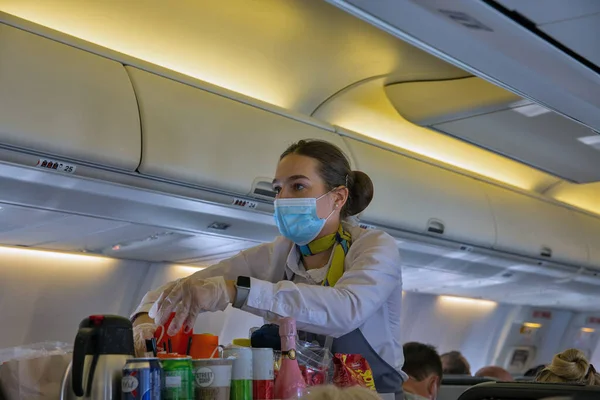
7. Messy or Spill-Prone Foods
Beyond smell, mess is another major in-flight faux pas. Foods like tacos, meatball subs, or saucy pasta can spill easily in turbulence and give crew and passengers cleanup headaches. Even dry snacks like popcorn or Goldfish crackers can spread across the floor, especially when children are involved. Flight attendants encourage people to pack snacks in secure, resealable bags and to avoid things that might stain clothing or carpets. This keeps the cabin cleaner and cuts down on slip hazards.
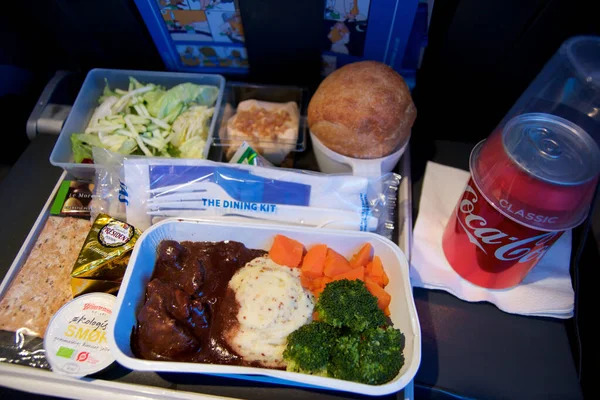
8. Indigestible Red Meat
Red meat-beef, pork, lamb-is digested much more slowly than poultry or fish and spends more time in the intestinal tract, where it produces gas. CNN reports that the lengthier digestion time may create bloating on particularly long-haul flights when passengers will be seated for hours. Travelers with easily upset stomachs would do better to stick to lighter proteins or plant-based options before and during air travel.
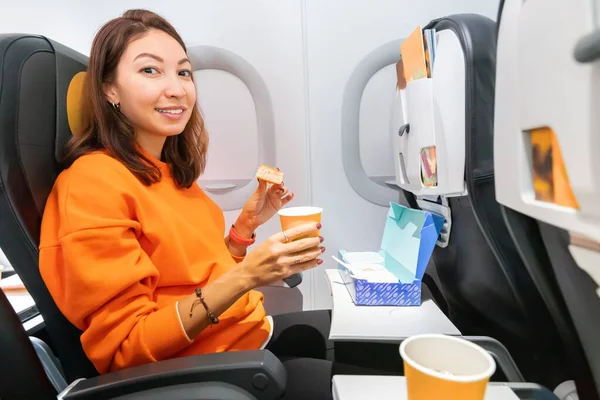
In-flight dining isn’t just about taste it’s about comfort, safety, and consideration for everyone in the cabin. Flight attendants’ advice blends etiquette with health science, offering travelers a smarter way to navigate onboard menus. Steer clear of these eight items to reduce bloating, prevent dehydration, and keep the cabin a more pleasant space. Sometimes, the best choice is to wait until you land for that coffee, cocktail, or indulgent meal and arrive feeling far better for it.


